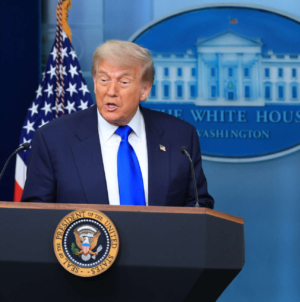-
Euclid fire in Chino Hills grows quickly, closes the 71 Freeway - 12 mins ago
-
U.S. and EU scramble to strike a trade deal ahead of Aug. 1 deadline - 24 mins ago
-
2025 College Football Odds: Wager On Longhorns Could Cash For $1.8 Million - 27 mins ago
-
Donald Trump Handed New Legal Loss Over Birthright Citizenship Order - 30 mins ago
-
What the latest downturn in the housing market means for buyers - about 1 hour ago
-
Columbia University Settles Legal Battle With Trump Admin: What To Know - about 1 hour ago
-
Brewers vs. Mariners Highlights | MLB on FOX - about 1 hour ago
-
Trump ordered purge of ‘unpatriotic’ park signage: California is first - 2 hours ago
-
Tesla profit slumped in second quarter, a sign Musk is hurting the brand - 2 hours ago
-
Canned Fruit Recall Sparks Nationwide Warning to Customers - 2 hours ago
How US Sanctions on Russian Oil Could Send Prices Soaring for Americans
Proposals to impose secondary tariffs on nations that purchase oil from Russia could increase the price of goods for everyday Americans, experts tell Newsweek.
Why It Matters
One of President Donald Trump’s pledges during his 2024 campaign was to end the war in Ukraine within 24 hours of taking office. However, six months into his presidency, efforts to do so have thus far failed.
This has prompted creative measures, such as tariffs, to deter Moscow, but experts warn that such moves will increase the price of gas and other key goods. That, in turn, may affect Trump’s popularity and impact the performance of his Republican Party in next year’s midterm elections.
What To Know
In March, Trump first warned he would impose the tariff measure, which would affect third-party countries trading with Russian President Vladimir Putin’s regime if Moscow failed to agree to a ceasefire in Ukraine, which it invaded in 2022. He repeated this pledge to reporters last week in the Oval Office.
“We’re going to be doing secondary tariffs,” Trump said. “If we don’t have a deal in 50 days, it’s very simple, and they’ll be at 100 percent.”
Meanwhile, Senators Lindsey Graham, a South Carolina Republican, and Connecticut Democrat Richard Blumenthal have sponsored a bipartisan bill that would impose primary and secondary sanctions against Russia and entities supporting Russia if Putin does not engage in peace talks. The bill includes imposing 500 percent tariffs on imported goods from countries that buy Russian oil, gas, uranium and other products.
What People Are Saying
Speaking to Newsweek, experts have outlined the impact that these proposals could have on the United States.
“If [Trump] carried this through, then it would push up prices of energy in America. Sectors which consume a lot of energy would be the hardest hit. Manufacturing, especially iron, steel, and metal manufacturing, are the highest users, followed by agriculture and mechanical engineering. But, of course, the result of this would be higher prices for U.S. consumers and would damage Trump’s popularity,” Hilary Ingham, a professor in economics at the University of Lancaster in the United Kingdom, told Newsweek.
“This is probably why the markets don’t think that this is a credible threat, as evidenced by the fact that Russian equities and the ruble both rose in value while the price of crude oil fell. Alternatively, if Trump could go ahead, he could try and get U.S. producers to up their production levels and/or to release some of their strategic reserves in order to mitigate the price increases faced by U.S. consumers,” she said.
Mikhail Metzel, Sputnik, Kremlin Pool Photo via AP
Mark Temnycky, a nonresident fellow at the Atlantic Council think tank’s Eurasia Center, agreed that “if the U.S. follows with new restrictions or tariffs, Americans could see higher energy prices, especially at the gas pump and in sectors tied closely to fuel, like transportation and manufacturing.”
“These cost increases may filter down to everyday goods as companies adjust for rising input expenses,” Temnycky told Newsweek. “In addition, inflation will be a concern for many American consumers and policymakers.”
However, he added that these price rises could be mitigated: “The impact of costs on energy will depend on how tightly these sanctions are enforced and whether oil from Russia continues finding buyers through other countries. If global supply remains steady via new routes, then the price spikes might be limited.”
Temnycky said the potential for economic pressure on Americans was also worth it.
“Additional sanctions on Russian energy are important as it will help bring a forceful end to Russia’s ongoing invasion of Ukraine,” he said. “Russia has generated billions of dollars in revenue from its energy industry, and the money earned from these transactions has helped stabilize the Russian economy despite stiff international sanctions on the Russian Federation.
“In addition, revenue from Russia’s energy sales allows the Russian Federation to purchase weapons and equipment for the war,” he added.
However, Nicholas Fenton, the associate director and associate fellow of the Europe, Russia, and Eurasia Program at the Center for Strategic and International Studies, said it was unlikely that these sanctions would even be implemented.
“As of now, the current U.S. proposals for ‘secondary tariffs’ on purchasers of Russian energy products would be incredibly challenging to implement,” he told Newsweek.
“The secondary tariffs of 500 percent as described in the Graham-Blumenthal sanctions bill, along with the 100 percent levies recently threatened by the White House, would be targeted at major international economies—China, India, the European Union, Japan—with the potential for massive disruption to international markets, including the systemically critical U.S. bond market.
“We got a taste of tariff-induced bond turmoil in April 2025, before the White House ultimately pressed pause on much of its previously announced tariff strategy,” he said. “For this reason, it is unlikely that these secondary tariffs would actually be implemented as currently designed, weakening their ability to serve as a credible deterrent to further Russian aggression in Ukraine.”
What Happens Next
Last week, the European Union agreed on its 18th package of sanctions against Russia, which included a ban on the import of refined oil products derived from Russian crude. Whether this bolsters calls for the American government to do the same remains to be seen.
Source link



























